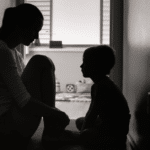
Power Struggles: Why We Get Stuck In Them & How to Move Toward Problem Solving

You don’t want to get stuck in yet another power struggle with your child, so why is it so hard to avoid power struggles? I can remember angrily looking at my determined, strong-willed child, thinking, “Oh, no, you don’t! You’re not going to win this one!” and the power struggle was game-on! The final score was usually 0-0, lose-lose, even if I managed to overpower my child.
I appreciate Jane Nelsen, PhD’s wise words: “I have never seen a power-drunk child without a power-drunk adult real close by.” (That would have described me at times…) Of course, some kids (even with easy-going parents) are more prone to engage in power struggles than others.
But it does take two to tango. If you’re in that repeated, well-choreographed “dance” of conflict with your child, read on. We’ll start with insight into the dynamics and some spiritual perspectives and then move on to practical tools and age-varied stories from parents like you.
You can “be the parent” and step away from power struggles
We’ve written a lot about connection, empathy, playfulness, and choices. These things can all decrease power struggles and grow cooperation. But in this blog post, we’re going to give you a specific tool that Connected Families’ coaching clients have been learning for years, “How to Move From Power Struggles to Problem-Solving.” You can retain your God-given parental authority and respond in a kind but firm way as you delegate some “healthy power” to your child. Your child doesn’t have to be your opponent in power struggles. Invite them to be your teammate in problem-solving!
And in the process, you’ll communicate a powerful message to your child: “You are CALLED and CAPABLE…of solving problems with those you love.”
Let’s start by understanding the dynamics and messages of a typical power struggle. Why do you get stuck in power struggles with your child? Check out this diagram of a typical power struggle below and see if it looks familiar.
Typical Power Struggle
Dynamics
- You and your child have opposing goals.
- You both experience strong anger from your blocked goals.
- Your conflict, though hurtful, often involves predictable, intense, attention and emotion. This can become a habitual way to “bond” because it meets a child’s valid need for intense connection.
Messages Communicated
- “You get the most connection when you fight with me.”
- “What’s important to you is unimportant. Only what I want is important or valid.”
- Your child might infer, “You are unimportant.” “You are a problem.” “You are in control of my emotions.”
- “Jesus is uninvolved in our conflict, and just expects us to figure it out.”
Team Problem Solving
Dynamics
- Children and parents agree on a shared goal of solving the problem in an honoring way.
- Negative emotions give way to connection and unity.
- At some point (before, during, or after), parents can explain God’s role in helping us work through problems.
Messages Communicated
- “What’s important to each person is important.”
- “You are capable of and responsible for solving problems you have with people.”
- “Christ is full of compassion, and present to help and give wisdom.”
Helpful scriptures could include: Philippians 2:3-4; Hebrews 4:15,16
Helpful questions could include:
- “How does everybody feel about this situation?”
- “How would we each like to feel about it?”
- “What’s important to each person?”
- “When this issue goes better, how does that happen?”
- “How could we find a solution that honors what is important to each person?”
*Helpful tip: If your child gets overwhelmed by questions, just choose one or two to ask.*
FREE “Power Struggles to Problem Solving” PDF
Download and print this FREE PDF for quick access to the most important content from this blog post. You’ll feel equipped to handle any “power-struggle” situation better.
Leaving the parent vs. child mindset behind brings more peace and unity
This is a vital process to bring more peace and unity to your home! In his book, The Explosive Child, Dr. Ross Greene says, “Challenging kids are lacking the skills of flexibility, adaptability, frustration tolerance, and problem-solving skills most of us take for granted.”
Researchers also recognize that problem-solving skills are important for kids to do well in life – “…problem-solving skills have a role in one’s success in the work environment, community environment, and family environment.” In fact, “Boosting activity in brain areas related to thinking and problem-solving may also buffer against worsening anxiety, suggests a recent study by Duke University researchers.”
But the value of solving problems together is deeper than that.
“Challenging kids are lacking the skills of flexibility, adaptability, frustration tolerance, and problem solving, skills most of us take for granted.”
Dr. Ross Greene
Solving conflict has deep spiritual significance
The Old Testament records seventy times that God’s people cast lots to solve conflict or discern what to do. Proverbs 18:18 says, “Casting lots settles arguments. It keeps the two sides from fighting.” This is how Joshua divided up the Promised Land, and it’s how Jesus’ 11 remaining disciples decided on who should replace Judas.
But, when the Holy Spirit came at Pentecost, believers no longer needed to cast lots to receive guidance or solve problems. Instead, they received the Holy Spirit and partnered with God to solve conflict and reconcile with one another. Acts 15:28 says, “It seemed good to the Holy Spirit and to us…” (to find a particular solution to conflict between Gentiles and Jews).
During a calm moment, you can help your kids understand the role of the Holy Spirit’s guidance in solving problems with others, maybe even with the biblical history lesson mentioned above. 😉
The key takeaway of this synopsis is that, in so many different ways, God is a God of reconciliation and really wants to help us solve problems with other people! If you and your kids have trusted Christ personally, don’t miss this! It’s part of your inheritance to have the Holy Spirit’s guidance when power struggles or conflicts threaten your family connection and unity.
And it’s part of your identity! Jesus said, “Blessed are the peacemakers, for they will be called children of God.” It’s an identifying mark of believers to bring true peace to conflict. No smooth-it-over, only one person gets their way, insincere, pretend peace. Instead, true peace that honors all!
This process will give your child more confidence in their ability to solve problems with others. You might even find a little less sibling conflict in your home. And you will definitely raise kids who are more equipped to reflect the unity and love that God has for them!

But how do I shift from power struggles to problem-solving?
Now that you’re inspired and encouraged, you may be thinking, “But how do I do this?” Read on! We are excited to equip you with 5 practical ideas.
- “But first, Connect!” If you have a persistent power struggle with your child, wait for a peaceful moment and ask God to give you wisdom. You can start with humility and affection. It might look like this: “I want to confess that sometimes I’m selfish, and I just want you to do what I want so my life is easier. But I love you, and I really do want to solve this problem in a way that honors both of us, so let’s ask God to help us solve this well together.”
- Ask helpful questions. Refer to the diagram (available in a PDF) for the list of questions to choose from. You could even draw out the two diagrams for your child.
- Relax, have fun with it! Even laugh at yourself. (As the parent, what does your face look like when you’re all cranky?! If you drew out the diagrams, add that to your side on the first one. 😉 It’s not important to get “the perfect solution” the first time. If your child’s solutions are even somewhat feasible, try those first and see how it goes.
- Evaluate and Celebrate…whatever went a little better. What did each of you do to make things go a little more smoothly? What was the impact of that effort?
You can celebrate: “God is helping both of us become problem-solvers! High five!” - Tweak your ideas and try again. How could you solve any glitches? When did this issue go the best? What did you learn that you could apply more often?
As you do this process regularly, your child will grow in their identity as a problem-solver:
“You are called to, and capable of, solving problems with the important people in your life!”
While power struggles can come at any time, often they seem to come at bedtime or during evening routines when everyone is tired. Below are some examples for you of applying this problem-solving tool with kids of three different (preschool, elementary, and teen) ages.
“You are called to, and capable of, solving problems with the important people in your life!”
Preschool power struggles at bedtime
Ellen, mom to 5-year-old Harry, 2-year-old Trevor, and an infant, shared their bedtime challenges:
“Harry and I had frequent power struggles at bedtime. In Harry’s words, he had big energy and a really hard time settling his body down for the bedtime routine. I talked through some of the questions in the problem-solving tool with him to find a solution together. We decided Harry and Trevor could run laps in the basement for ten minutes to a timer and music before brushing their teeth. When Harry went to bed that night, he said, ‘I could sleep a thousand miles after all those laps!’ and fell quickly asleep.
But… our success was short-lived. Unexpected events threw our schedule off the next night, and Harry led his little brother in some lively mayhem at bedtime – including crashing through a fort and calling me the Toothbrush Monster! Argh! We worked through our conflict, and the next day I tried again.
This time, before starting the bedtime routine, I sat Harry and Trevor down in the kitchen with a sugar-free popsicle. (I had learned that kids can stay calm and interact better if there is something cold in their mouth or if they are sucking or chewing something. And it helps if the experience is, in general, more delightful!)
While they had their popsicles, Harry and I talked through the problem-solving questions again and read Philippians 2:3-4 and Hebrews 4:16. We talked about the importance of caring for others instead of just for ourselves and the promise that when we ask God for help, He will help us! Harry said he still felt the issue was that he needed to get all his energy out and that he would like to try the plan again. I could see he really wanted to do the right thing and wanted us to have a peaceful bedtime.
As I continued to work on this new routine, it helped to ask Harry, ‘How do you want bedtime to go?’ and ‘What do you need to do to make that happen?’ Harry said, ‘I want to do what I did last night! When the timer goes off, I go into the bathroom. And then I do lotion and pajamas, and it goes so fast, and I get ready for sleep.’ It felt like an accomplishment to him.
We had also previously talked about how power struggles can be like opposing magnets. Harry and Trevor love Magna-Tiles, and they really understand the frustration of magnets repelling each other! So when things worked well during the bedtime routine, Harry said, ‘This is so good! Our magnets are working!’”
Ellen went beyond a rigid expectation of immediate obedience from her active five-year-old. She equipped him with a sense of partnership with God and others to solve problems in ways that honor all and strengthen relationships.
After-school power struggles in elementary-aged kids
(For an example of problem-solving bedtime with elementary-aged kids, see the Discipline That Connects book appendix, starting on page 255.)
Taylor, a Connected Families certified parent coach, shared her story:
“It was a Monday afternoon, 5 pm. Monday nights were swim team nights at our house, and it was typically a battle getting my girls, ages 9 and 7, out the door on time. They much preferred lounging on the couch to watch their favorite 30-minute TV show. I looked at my watch, did some quick math, and realized this had the potential to be a battle. Memories of shouting, nagging, and dragging two reluctant girls to the van flooded my mind, and I knew I didn’t want it to end this way. I took a deep breath. I knew another way, but it would take some careful thought and consideration.
I put aside those dreaded thoughts and paid attention to what was going on inside of me. I knew we had to leave in 20 minutes, which would be 10 minutes before their TV show was over. My girls didn’t even have their swimsuits on, much less their towels, flip-flops, and goggles ready. I asked Jesus to guide me to help these girls build wisdom and lead me as a mom to love them well.

As I considered what it was like to be them, I thought about their exhaustion from the day. Mondays were always difficult for them. This TV show provided them with 30 minutes of rest, something their bodies were probably craving. The thought of swimming must feel impossible, as they were already tired.
I took a deep breath, calmed my anxiety, and entered the room in peace. I sat down beside them and commented on what a great, funny show it was and how I loved seeing them laugh along with it. I then asked them to pause the show.
‘Hey, so again, great show. I’m wondering if you remember what today is.’
‘Hmmmmmm…….awwwwww Mammaaaaa it’s swim team day! We’re tired!’ they protested.
‘I know. And I get it. This show is really great and it feels really good to enjoy this together. I love watching you enjoy things you love. However, we did make a commitment. Do you remember what we agreed to?’
(With eyes rolling) ‘We said we would go to practice.’
‘Yeah, we did, didn’t we? What happens if we go to practices?’
‘We get stronger and faster.’
‘Yep, that’s right. Now, I know you love this show. But we only have 20 minutes before we need to leave. I can see it’s really important to you that you finish this show. And it’s really important to me that we are on time. What can we do to make sure we both get what is important to us?’
We talked about that for a bit and threw out suggestions, but in the end landed on this: they would get ready quickly and then watch the show until it was time to leave, and then we’d pause it. Instead of making them shower right away when we got back, I would let them finish their show and then shower. We celebrated that we figured out a way, and they got ready very quickly. In the car we talked about how good it felt to be on time and to not argue about it!
There were no power struggles that day! And I believe we all grew in wisdom.“
The transition to the car went on a whole different trajectory when Taylor paused to consider what was going on in her and what it was like to be her tired girls. Over time she continued to address screen issues from a helpful, empathetic perspective.
Night-time power struggles with teenagers
Denise shared her story about her teenagers:
“My three kids had a pretty well-established bedtime routine, but gradually, my two teens began to gravitate toward late nights (that perfect time to chat about everything 🙂) and then sleeping in. When I finally woke them up, they were crabby, and the whole morning routine was thrown off.
My youngest was still an energetic early riser, so this did NOT make for a pleasant morning! I wanted to honor their changing habits and growing independence, but also everyone’s need for sleep and structure to function well. So one night when we were just hanging out, I asked some questions: ‘How have nights been going? Mornings? How do things go when we all stay up late and then start school late? How did you feel when we had a more consistent routine?’
There was a fair amount of grumbling at first, but I was careful to keep the questions light-hearted and conversational. Eventually, my older teen said, ‘I know I have been irresponsible in getting up on time. And it’s actually been really stressful. My anxiety and ADHD were easier to manage when I stuck with a morning and evening routine, but it’s so easy to get off track!’ Both teens agreed there could be improvement. They came up with a new routine that accommodated some of their needs in the evening but also allowed everyone to get to bed at a reasonable hour.

The next several nights, one of my teenagers actually began reminding everyone else of what time we needed to be ready for our nightly time together! My teenagers are forming habits as they grow toward adulthood that feel like their own values, not just mine. I don’t anticipate that this will always go smoothly because that is just life. But we came up with a good solution, and they will probably be receptive if I graciously refer back to that conversation.”
Denise was sensitive to her teens’ growing need for independence and ownership so that they could genuinely embrace wise values and habits.
Now that her teens are older, Denise shared this:
“My kids are now older. One is an adult in college, still living at home, and the other is a junior in high school. These older two have a great deal of school work and responsibility during the school year, and they are pretty disciplined about getting to bed on time, knowing they will fall behind on their schoolwork and responsibilities if they don’t. The time we took to get a better routine when they were younger helped them to develop good habits that they value and initiate mostly on their own. And my previously compliant youngest is now a spicy teenager, and I’m grateful to have those problem-solving skills that I honed with my older two!”
Problem-solving is better than a power struggle every time
Imagine if all kids learned to solve problems with others in honoring ways by drawing on God’s wisdom! When you’re in a conflict with your child, receive Jesus’ mercy and empathy and then seek the Holy Spirit’s guidance to turn the power struggle into a problem solved. It may be a blessing to far more than just your family!
© 2024, 2022 Connected Families





